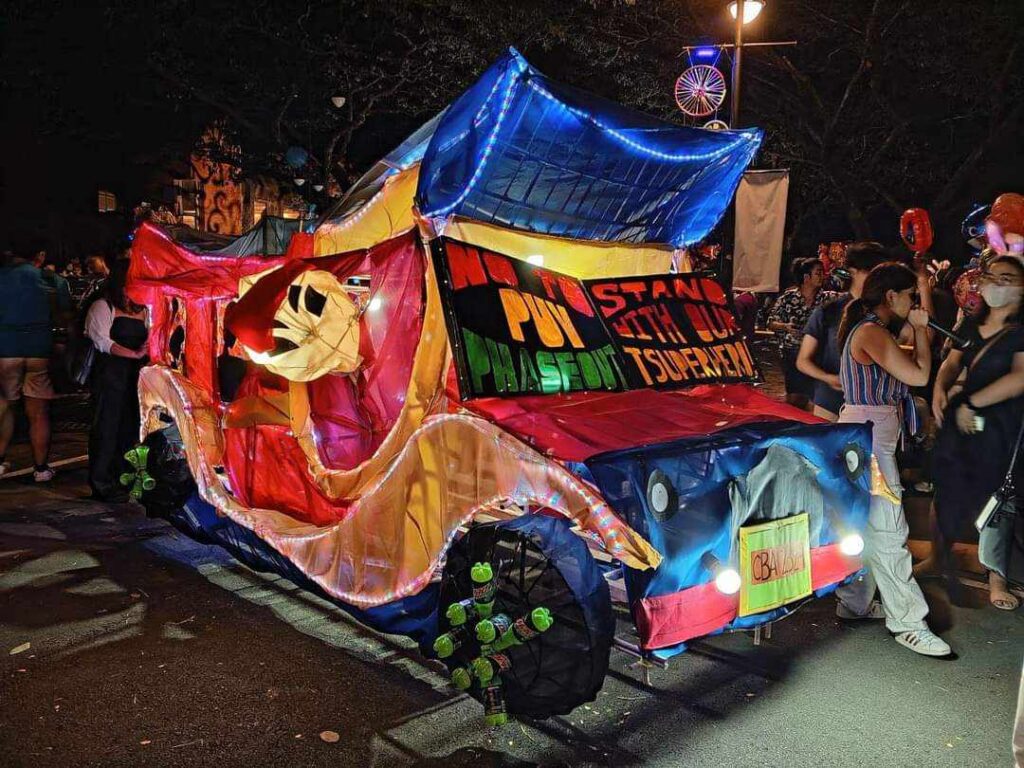IKOT jeep phaseout highlighted in UP Lantern Parade

Participants of the December 20, 2023 UP Lantern Parade support drivers of IKOT Jeepneys calling for a pushback the PUV modernization program. | Dennis Gorecho
The iconic IKOT Jeepneys took center stage during this year’s Lantern Parade last December 20, 2023 at the University of the Philippines in Diliman.
Participants echoed the call on the government to push back the public utility vehicle (PUV) modernization program.
“Ikot” means “to go around” because the route of the Ikot jeep is within the campus only. Other jeepneys go outside the university. It can be distinguished, the Ikot jeep, by its yellow roof, and a sign on the windshield that reads “IKOT”.
“Stand with the jeepney drivers. Say no to PUV Phaseout!” as noted in the petition initiated by the Rise for Education Alliance – UP Diliman days before the Lantern Parade.
Under the program that aimed to make public transport “efficient” and “environmentally friendly”, PUVs, including traditional jeepneys aged 15 years or older, will be phased out and replaced by electric-powered or Euro 4 compliant vehicles which cost around P1.8 million each.
The petition stated: “As the deadline for franchise consolidation for traditional jeepneys is fast approaching, the livelihood of jeepney drivers and small operators are threatened. Phasing out our jeepneys would have an immediate and direct impact in all of our local routes in campus, particularly, our UP IKOT, Philcoa/Pantranco, SM North EDSA, and Katipunan.”
It added: “In addition, this would increase the fare of passengers to P40-60. At a time where huge corporations are highly prioritized, the UP administration should take a different route and uphold their mandate of genuinely serving the community by standing firm against the PUV modernization program and monopolization of public transportation. “
I have celebrated my birthday inside the UP Diliman campus several times, in most instances coinciding with the traditional Lantern Parade.
UP normally celebrates the most festive of seasons the best way we can imagine with a parade of lights, floats and every single extravaganza UP students could practically think of.
The parade traverses the UP Academic oval under the acacia trees that are silent witnesses to the travails of the Diliman denizens.
Canopied by over a hundred years old sturdy acacia trees, the Lantern Parade reflects UP’s role as a sanctuary of advocates of civil rights and academic freedom, especially in times of uncertainty and social turmoil.
The Lantern Parade started in 1922, inspired by the folk practice of carrying lanterns of various shapes and sizes to light the way to the early morning December masses or misa de gallo during the Spanish period.
It was institutionalized in 1934 by UP President Jorge Bocobo “so that students can have a frolicsome activity before the year ends.”
“From its beginnings as a simple homage to an old Christmas tradition to the elegant, colorful, sometimes controversial creations that strut (or sometimes sputter) around the UPD academic oval each Yuletide, the Lantern Parade has evolved into an event that reflects both the people and milieu of its time, depicting the changing social and political landscape of the University and indeed, the country,” according to the UP website.
I remember my first lantern parade in 1987 during my freshman year, which lasted for six to eight hours when six wheeler trucks were still allowed.
In support of the protest of transport workers on the three centavo increase in oil prices, the Diliman Commune occurred more than 50 years ago, from February 1-9, 1971, as an uprising led by the UP Diliman students, faculty members, and residents.
The Diliman Commune was hailed as the first ever display of mass resistance from the UPD community, the first student action after the First Quarter Storm, and a historical point in the long history of radical activism in UP.
The “communards” bravely fought for the safety of the campus against the violent police and military force under the common banner of academic freedom and the right of peaceful assembly. “Babalik kami. Mas madami.’
Due to the pandemic, the traditional lantern parades were not celebrated in the various UP campuses for two years in a row.
In 2021, the “People’s Lantern Parade” in Diliman was held as an informal activity organized by the College of Engineering and School of Economics (my home college as well as that of former Vice President Leni Robredo). With the theme “Parada ng Pag-ibig at Pag-asa”, most participants carried pink parols of various sizes as the parade aims to symbolize calls to end corruption and its adherents, and to fight for democracy, human rights, and the welfare of Filipinos.
The parade reverted back to its face-to-face format last year.
The campus molded us to fight for the causes we believe in; trained us for the skills we need to communicate ideas and rally others to effect changes in society.
The lantern parade is a reminder that we should not only reminisce the innocence and enthusiasm of our youth but we also have to look at the joys in our lives.
(Peyups is the moniker of University of the Philippines. Atty. Dennis R. Gorecho heads the seafarers’ division of the Sapalo Velez Bundang Bulilan law offices. For comments, e-mail info@sapalovelez.com, or call 0917-5025808 or 0908-8665786.)
ALSO READ
To teach law in the grand manner
Fishers as victims of human trafficking
Execution bond in the Magna Carta for Filipino Seafarers is anti-labor and unconstitutional
Magna carta should expand, and not limit, the seafarers’ rights
/dbs
Disclaimer: The comments uploaded on this site do not necessarily represent or reflect the views of management and owner of Cebudailynews. We reserve the right to exclude comments that we deem to be inconsistent with our editorial standards.
